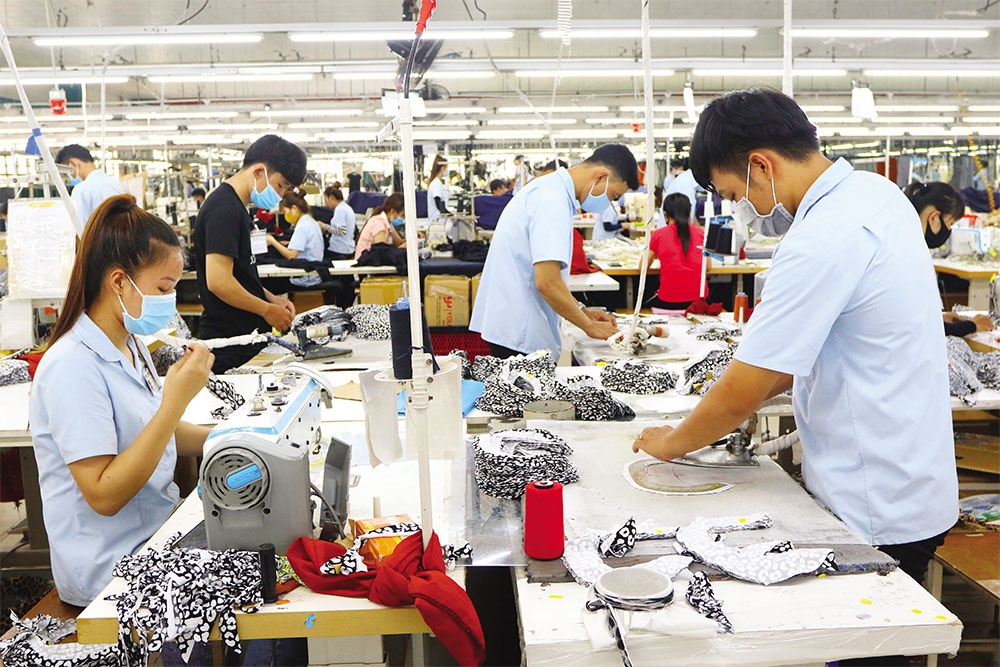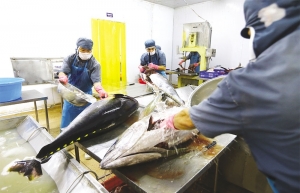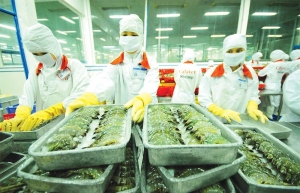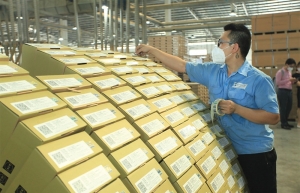Local groups stuttering amid drop in new orders
 |
| Photo: Le Toan |
Last week, Ty Hung Co., Ltd., which produces leather shoes for export in Ho Chi Minh City’s Binh Tan district, announced it would terminate the contracts of nearly 1,200 out of its 1,822 employees.
The announcement stated that due to global economic impacts, the partners faced difficulties that were headlined by the company not having any production orders. Despite applying several emergency measures, Ty Hung still struggled in production and was unable to restore operations. Therefore, the company said it had no choice but to reduce both production and labour.
Similarly, footwear producer Vietnam Samho Co. Ltd., in the city’s Cu Chi district, last week informed Ho Chi Minh City Department of Labour, Invalids, and Social Affairs about the plan to cut 1,400 employees from December due to the drop in orders.
Vu Hoang Minh, owner of a footwear producer in Ho Chi Minh City, said that the company has cut 20 per cent of its total employees and planned to reduce by an additional 20 per cent. “Over the last month, we have rotated the rest of the workers, but we have not saved much. The salary fund of more than VND1 billion ($43,470) per month places pressure when orders are reduced by 40 per cent,” said Minh.
Phan Thi Thanh Xuan, vice chairwoman and general secretary of the Vietnam Leather, Footwear, and Handbag Association, said that the decline in export orders has occurred in all enterprises in the industry. The average volume of exported goods has decreased by about 30 per cent compared to the beginning of the year.
“Specifically, the export turnover of leather and footwear in September was only $2 billion, while it was $2.6 billion in August. The drop in orders in the fourth quarter is more severe and may continue until the middle of 2023,” said Xuan.
The reason is high inflation causing purchasing power in major markets such as the US and EU to plunge, causing large inventory without new orders.
“They are the two main export markets, accounting for more than 70 per cent of the export turnover of Vietnam’s leather and footwear industry, so although some small markets are maintained, they cannot make up for the shortfall,” added Xuan.
The industry’s export turnover in the first nine months of 2022 has reached about $21 billion, meaning it is still possible to achieve the full-year export target of $23-25 billion. But the most difficult aspect will be production next year. “The only way is for enterprises to try and diversify and expand export markets, for example, into South America,” said Xuan.
The textile and garment industry has also fallen into a similar situation, with orders dropping sharply in the last couple of months. The fall was predicted, but the speed has alarmed some enterprises.
“In the fourth quarter and possibly into next year, the textile and garment industry will face difficulties and many businesses may be reduced by 50 per cent on orders,” said Nguyen Thi Tuyet Mai, deputy secretary general of the Vietnam Textile and Apparel Association. She added that numerous businesses are close to shutting up shop entirely because of the lack of capital to operate.
She also suggested focusing on the domestic market and neighbouring and stable markets such as Southeast Asia, Japan, and South Korea. “If there is a suitable approach early, it will help businesses curb the decline in orders to overcome woes, and diversify exporting markets,” added Mai. “But in the long run, businesses need to quickly increase automation in production to reduce costs and increase competitiveness.”
Although it does not yet have to close down or lay off workers, Lee Fu Wood Co., Ltd., located in Tam Phuoc Industrial Park in the southern province of Dong Nai, also last week informed that only moderate production will be taking place in the short term. As there are no orders, workers will not be required on Saturdays, and it is likely that the company will close its doors for an entire month around the Lunar New Year period.
In addition, many food products are also facing a decline in orders. Bach Khanh Nhut, vice chairman of the Vietnam Cashew Association, said that the increase in USD exchange recently has not pleased businesses because demand has dropped for most items, causing the cashew industry to fall into a gloomy period with consumption falling at least 20-25 per cent compared to more stable times.
“We may benefit from the exchange rate, but the volume of exporting goods has decreased sharply. The selling price will not be able to increase again until early 2023 if inflation does not calm down,” Nhut said.
Meanwhile, a representative of the Vietnam Pepper Association said that due to slow consumer demand, the price of pepper has gone down by 30 per cent compared to earlier in the year.
“The United States is a large pepper import market of Vietnam, but inflation has caused customers to reduce their purchase volume,” said the representative.
According to Dang Phuc Nguyen, general secretary of the Vietnam Fruit and Vegetable Association, businesses should not pour much capital into production at this time and consider downsizing and focusing on products with good demand or good prices every season in the US or Europe.
“Moreover, enterprises should carry out deep processing to maintain production and not be dependent on buyers,” said Nguyen.
 | Vietnam’s seafood exporters suffering with euro fluctuation Following exchange fluctuations, Vietnamese seafood exporters are now faced with catastrophic changes in their orders, forcing them to lower export prices or find other solutions to stay competitive in the long run. |
 | Seafood exporters tasked with improving their game Amid high inflation and the devaluation of the Euro, tie-ups with the European continent are providing an opportunity for fisheries to be more active in sustainable development and up their game when it comes to the agreed rules of origin on seafood exports to the EU market. |
 | Vietnam’s wood exporters under FSC standard pressure Weak export market demand and stable freight rates rendered some wood materials imported into Vietnam cheaper. However, FSC-certified logs imported from the EU market become more expensive for Vietnamese manufacturers, forcing them to look at home-grown, certified solutions. |
What the stars mean:
★ Poor ★ ★ Promising ★★★ Good ★★★★ Very good ★★★★★ Exceptional
Related Contents
Latest News
More News
- Masan Consumer names new deputy CEO to drive foods and beverages growth (February 23, 2026 | 20:52)
- Myriad risks ahead, but ones Vietnam can confront (February 20, 2026 | 15:02)
- Vietnam making the leap into AI and semiconductors (February 20, 2026 | 09:37)
- Funding must be activated for semiconductor success (February 20, 2026 | 09:20)
- Resilience as new benchmark for smarter infrastructure (February 19, 2026 | 20:35)
- A golden time to shine within ASEAN (February 19, 2026 | 20:22)
- Vietnam’s pivotal year for advancing sustainability (February 19, 2026 | 08:44)
- Strengthening the core role of industry and trade (February 19, 2026 | 08:35)
- Future orientations for healthcare improvements (February 19, 2026 | 08:29)
- Infrastructure orientations suitable for a new chapter (February 19, 2026 | 08:15)

 Tag:
Tag:




















 Mobile Version
Mobile Version